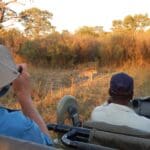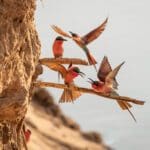Whether you’re travelling in Africa or anywhere else in the world, you’ll often encounter opportunities to interact with animals. Elephant rides, walking with lions, or photos with cute baby animals all offer close wildlife interactions. As an animal-friendly traveller, you’ll want to avoid them.
In Africa, these activities are often promoted as sanctuaries or rescue facilities. Animal-friendly travellers are led to believe they are supporting a worthy cause. Genuine animal rescue facilities do not allow direct visitor interaction with animals that will eventually be rehabilitated back to the wild.
Wild animals are regularly taken from their natural environment and exploited for entertainment and profit. Those cute lion cubs, once they get too big (and therefore too dangerous) to interact with humans, can never be rehabilitated back into the wild. They are doomed to a life of confinement in circuses, zoos, unregulated private collections or, worst of all, being sold to the canned hunting industry.
When male lions develop full manes, they are sold to hunters in an industry known as ‘canned lion hunting’. Because they have never lived in the wild, their faces and ears do not bear the scars from fights with other lions. Their ‘perfection’ makes them desirable to hunters. They are shot in a fenced area which makes it easier for the shooter, who has paid a huge sum of money for the lion’s head, to get a direct hit. The hunter can then boast of his success in killing an animal that had no chance of escape. If you want to learn more about the atrocities of the canned hunting industry watch Blood Lions – but be warned, it’s not easy watching.
Tips on being an animal-friendly traveller
- Do your research before you go, read articles about wildlife interactions around the world, and avoid controversial ones.
- Make positive choices and support tourism that doesn’t exploit wildlife.
- Don’t participate in rides or performances involving wild animals, including elephants. The animals may have been cruelly trained, or be tied by ropes and chains, and be under the constant command of their master, causing relentless stress.
- Don’t pose for photos with wild animals. Most of the facilities that offer lion cub petting claim that their cubs were orphaned, abandoned or rejected by their mother and that the facility has rescued them. This is not true, they have been removed from their mothers too early and raised by hand. They have frequently been declawed, or have had their teeth filed or removed to control natural behaviour – which would include scratching or biting paying visitors!
- Think before you buy. Locally produced animal souvenirs may drive demand for illegal wildlife trade.
- Spread the word. In conversations with my guests, I know many are simply not aware that very often all is not as it seems with wildlife facilities and rescue organisations. Use social media and word of mouth to encourage friends and family members to become animal-friendly travellers too.
- If in doubt, don’t take part. You have a choice and a voice to say NO. The animals have no choice.

Volunteering has its challenges too
The idea of spending a few weeks volunteering in a wildlife facility may be very tempting for many animal lovers, but, once again, doing your research is vital. ‘Voluntourism’ is big business, and seldom in the best interest of the wildlife. Volunteers who are made to believe that they are supporting bona fide conservation projects and that lion cubs will one day be successfully reintroduced into the wild are being lied to. Lion ecologists state that captive breeding plays no role in the conservation of this species whatsoever.
Being an animal-friendly traveller isn’t difficult
Finally, support tour operators and organisations that offer positive wildlife experiences. While there are many profit-driven operators out there, there are also many reputable organisations doing a wonderful job rescuing and rehabilitating wildlife. Where possible we include them in our safaris and support their invaluable work, and I’ll introduce some in a future blog.
Need help planning your bucket-list safari?
We’d love to chat with you about how we can ensure you’ll be an animal-friendly traveller on our luxury small group safaris in Africa. Get in touch today!





